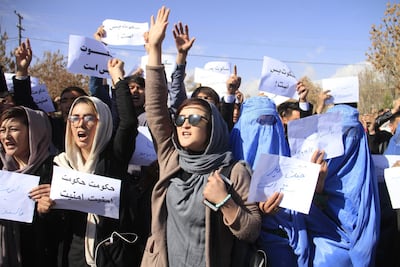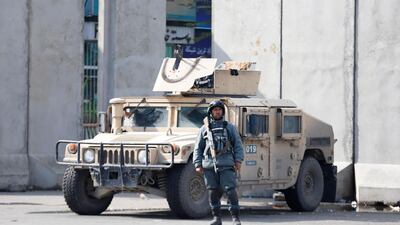A loud explosion close to a group of protesters in the Afghan capital of Kabul claimed at least four lives, and injured eight others on Monday.
Several hundred residents had marched to and gathered near the Presidential Palace late on Sunday night, to protest against a recent spike in Taliban attacks in Ghazni and Uruzgan provinces.
According to security officials, a suicide bomber on foot detonated his vest just as the protesters were dispersing.
ISIS claimed the attack shortly after through their propaganda agency Amaq, but did not give evidence of it.
“I joined the protests at 7am, others had been there all night,” said Nilofer Muradi, a 23-year-old law student from Kabul.
Ms Muradi and thousands of other fellow Afghans were demanding government action against Taliban attacks on Jaghori and Malistan districts of Ghazni – two predominantly Hazara-Shia areas.
The majority of the protesters belonged to the Afghan minority that has increasingly been targeted by insurgent groups, especially by the relatively new ISIS insurgency in Afghanistan.
______________
Read more:
Taliban destroy Afghan army base, kill 16
US peace envoy to visit UAE, Afghanistan, Qatar and Pakistan
Russia flaunts Taliban talks snubbed by Afghan government
US requested release of Taliban founder to help peace talks
______________
Attacks in the southern districts have been ongoing for over a week, with the Taliban making inroad into district centres. About 25 Afghans, including 15 civilians and 10 commandos, were reportedly killed in Jaghori on Sunday.
Khudada Jaffari, a 57-year-old resident of Malistan told The National that several local families had fled the fighting, while Taliban fighters closed in on key government buildings.
“My neighbours who had a car or motorbike have escaped the area, but those who didn’t have any vehicle have escaped in the mountains,” he said, adding that he stayed behind to protect his family home and his neighbour’s property, even as his own family escaped to a safer area.
Mr Jaffari also said that by his own estimate there were several thousand people in the mountains without access to resources and exposed to nature. “They do not have access to water and food and temperature is below zero and they will die if they aren’t able to return soon,” he said.
While Mr Jaffari has sufficient food stored for the winter, a common practice in colder Afghan regions, his water supply hasn’t been replenished. “I don’t have access to water because I have to fetch it from the river and I can’t get out,” he said, adding that he is hopeful that the government will intervene and come to his rescue. “Government has to deploy more forces here and also send air support for the soldiers trapped inside the government buildings. If the government does not act quickly, our soldiers might get killed and then we might get killed,” he said. “Government has to act quickly and end the war here so I could go and bring water for myself and my cattle.”

On Monday morning President Ashraf Ghani heeded the collective call for a stronger military response.
In a call with demonstrators, a recording of which has been heard by The National, he assured there would be airstrikes and an increase in troops.
“Last night I ordered the airstrike and this morning I ordered the Army Chief to go to Ghazni personally and take control of the battle. Commando forces, 201 corps on their way to Malistan now,” he said, adding that aid was also being sent to the displaced residents of Ghazni.
Admitting to shortages in the army, President Ghani explained why response had been difficult. “We do have a problem in hiring new soldiers which is why we can't create the new army division right away,” he said, urging people to support the nation’s military.
Noting the success of the demonstration, and with their concerns addressed, the majority of the Kabul proteters, including Ms Muradi, dispersed.
"We did get the opportunity to talk to General Murad who is the chief of Kabul Garrison and protest organisers talked to the president over phone who promised airstrikes on Taliban stronghold in Ghazni and Uruzgan," she told The National.
The explosion followed shortly after.
“There were roughly 3,000-4,000 people and another group of 2,000 students from Kabul University were on their way when we heard the boom,” she said. Among those killed and injured were security officials, and local policemen.
The Taliban has continued to intensify attacks around the country even as they meet international administrations peace talks. The insurgent group, on Friday, attended a meeting hosted by the Russian administration in Moscow, and attended by various stakeholders including the Afghan High Peace Council, to discuss the future of peace negotiations on the Afghan conflict.

